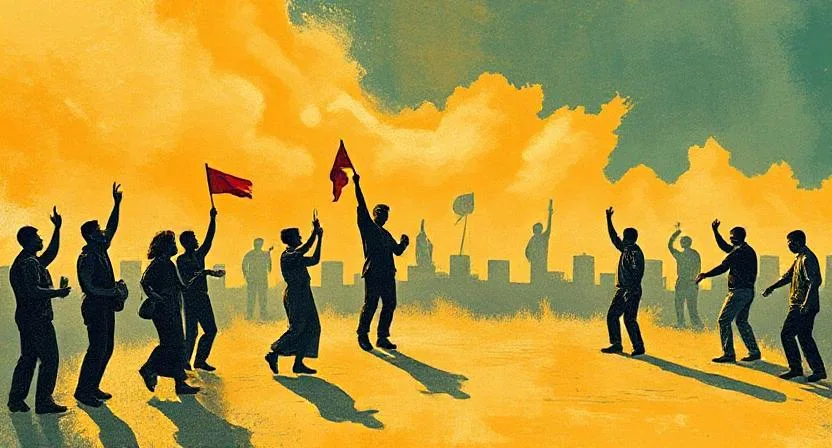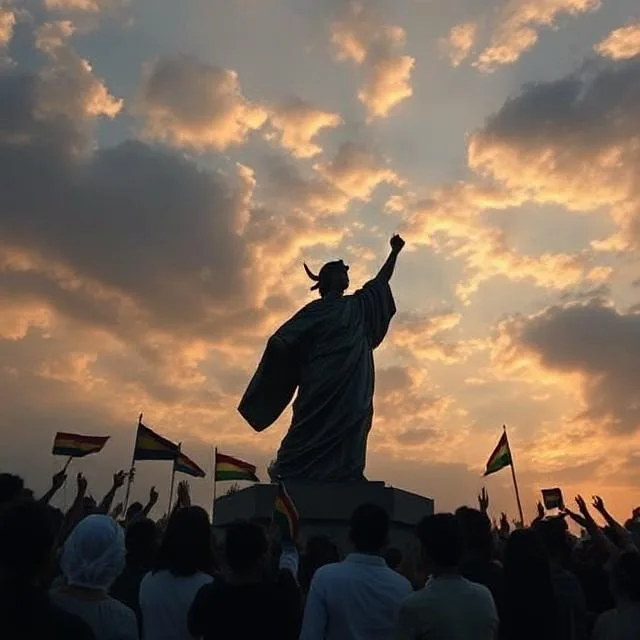Freedom is often considered a fundamental human right, universally valued for its ability to empower individuals and societies. However, the interpretation of freedom varies significantly across cultures. While the concept of freedom might be universally acknowledged, its meaning, value, and the way it is pursued are deeply influenced by cultural, historical, and societal contexts.
By exploring diverse perspectives on freedom, we can appreciate how cultural values, historical experiences, and philosophical beliefs shape our understanding of what it truly means to be “free“. The following sections will examine how different cultures approach freedom and the unique lenses through which they define autonomy, rights, and responsibilities.
The Western Perspective: Individual Liberty and Autonomy
In Western societies, freedom is primarily associated with individual liberty, personal rights, and autonomy. This perspective is deeply rooted in historical milestones such as the Enlightenment and the American Revolution, which championed the ideals of democracy, equality, and personal freedoms. The Western emphasis on individualism has shaped the development of human rights, emphasizing personal freedom of speech, religion, and choice.
In the United States, the Constitution enshrines individual freedoms, while in European countries, the notion of liberal democracy aligns freedom with the protection of personal rights and freedoms from government interference. In this context, freedom is often seen as the ability to make personal choices, pursue individual goals, and express one’s views without fear of persecution.
The Western interpretation of freedom stresses autonomy and individual rights, but it also raises important questions regarding the limits of personal freedom, especially when it intersects with the rights of others or the needs of society.
Eastern Philosophies: Freedom as Harmony and Balance
In contrast to the Western focus on individualism, Eastern philosophies often see freedom as a form of harmony and balance. In traditions such as Confucianism, Taoism, and Buddhism, freedom is not viewed as an individual right but as an alignment with nature, society, and the cosmos.
In Confucianism, freedom is tied to the fulfillment of social roles and maintaining harmony within the family and community. Taoism encourages living in harmony with the Tao, or the natural flow of the universe, where freedom is achieved by letting go of rigid structures and desires. Buddhism offers a view of freedom as liberation from suffering, attained through self-discipline and meditation.
Eastern societies also emphasize collectivist values the belief that freedom is inherently linked to the wellbeing of the community. This contrasts sharply with Western individualism, as in Eastern cultures, individual desires are often subordinated to the greater good of the group.

African Traditions: Communal Freedom and Ubuntu
In many African cultures, the concept of freedom is intricately tied to the community rather than the individual. The philosophy of Ubuntu which translates to “I am because we are” emphasizes the interconnectedness of all people. In this view, true freedom can only be realized when individuals are part of a nurturing, supportive community.
This communal sense of freedom has historical roots in African traditions, where shared responsibility and mutual support are vital to the survival and prosperity of the group. During the colonial period, the African struggle for freedom was not only about the liberation of individuals but also the restoration of the community’s autonomy and dignity.
Today, African liberation movements continue to advocate for both individual and communal freedoms, seeking to recover cultural heritage and self-determination in a post-colonial context.
Indigenous Worldviews: Freedom and Connection to Land
Indigenous cultures across the globe have a distinct relationship with freedom that is deeply connected to land, spirituality, and ancestral heritage. For many Indigenous peoples, freedom is defined not by the ability to act independently but by the ability to live in harmony with the earth and to maintain their traditional ways of life.
Colonization has had a profound impact on Indigenous freedoms, often resulting in displacement, loss of land, and the erosion of cultural practices. Indigenous peoples view freedom as the right to maintain their cultural identity and control over their ancestral lands, which are integral to their spiritual and physical wellbeing.
Contemporary movements for Indigenous rights continue to fight for sovereignty, land reclamation, and the protection of cultural practices, asserting that true freedom cannot be attained without the preservation of their relationship with the land.
Middle Eastern Perspectives: Freedom in the Context of Faith and Governance
In the Middle East, the concept of freedom is often viewed through the lens of religion and governance. Islamic teachings, for example, provide a framework for freedom that is deeply tied to the will of God and the moral guidance of the Qur’an. Freedom in this context does not mean absolute autonomy but rather the freedom to live in accordance with divine principles and societal laws.
The tension between tradition and modernity has led to complex debates in the Middle East about the role of freedom in governance, particularly with the rise of movements like the Arab Spring. These uprisings have highlighted the desire for political freedoms, including democracy, free speech, and social justice, while navigating the region’s religious and cultural values.
Islamic thinkers also emphasize freedom within limits, advocating for societal well-being and the collective good, which may sometimes involve restrictions on individual freedom.
Freedom in Collectivist vs. Individualist Societies
One of the key distinctions in the global understanding of freedom is the contrast between collectivist and individualist societies. Collectivist cultures, such as those found in East Asia, prioritize the needs and goals of the group over those of the individual. In these societies, freedom is often viewed as the ability to contribute to the community’s welfare and to fulfill one’s role within society.
In contrast, individualist societies, particularly in North America and much of Europe, focus on the rights of the individual to choose their own path, express themselves freely, and pursue personal ambitions. This clash of values often leads to misunderstandings and conflicts, especially in the context of globalization, where cultural norms are continually evolving and interacting.
Globalization and the Evolving Concept of Freedom
Globalization has significantly impacted how freedom is understood across cultures. The spread of democracy, the rise of digital freedom, and human rights movements have all contributed to a more interconnected global discourse on freedom. However, globalization has also led to concerns about cultural imperialism, where dominant cultures impose their definitions of freedom on others, potentially eroding traditional values and ways of life.
At the same time, cross-cultural exchanges have led to the blending of ideas, allowing for new understandings of freedom that incorporate diverse perspectives. The evolution of freedom in the digital age, where online platforms offer new spaces for expression, is also reshaping how different cultures approach autonomy and rights.
Freedom in Art, Literature, and Media: A Cultural Lens
Freedom is often explored and expressed in art, literature, and media, where different cultures communicate their values, struggles, and aspirations. Iconic works of art, novels, and films offer powerful representations of what freedom means in a cultural context.
For example, Western literature often celebrates the individual hero’s quest for personal freedom, while Eastern art may focus on themes of balance and spiritual liberation. Similarly, African art and literature reflect the importance of community and collective freedom, while Indigenous storytelling frequently emphasizes the sacred connection to land and the consequences of losing that freedom.
Challenges to Freedom: Cultural Relativism and Universal Rights
The tension between cultural relativism and universal human rights presents a significant challenge in defining freedom globally. While some argue that freedom should be understood within the cultural context of each society, others believe that certain rights, such as freedom of speech, should be universally upheld.
The conflict arises when the pursuit of freedom in one culture clashes with traditional practices or values in another. Navigating this tension requires a balance between respecting cultural diversity and upholding universal freedoms that ensure human dignity and equality.
Conclusion: Embracing a Multifaceted Understanding of Freedom
As we have seen, freedom is a complex and multifaceted concept, shaped by diverse cultural, historical, and philosophical influences. Each culture offers a unique perspective on freedom, whether it’s the individualism of the West, the communal values of Africa, or the balance of Eastern philosophies.
In a globalized world, it is essential to respect these diverse interpretations and to foster dialogue that encourages mutual understanding. By embracing the richness of cultural perspectives on freedom, we can build a more inclusive and harmonious global community.
FAQs: Cultural Perspectives on Freedom
What is the difference between Western and Eastern views of freedom?
Western views emphasize individual autonomy and personal rights, while Eastern views prioritize harmony, balance, and collective well-being.
How do Indigenous cultures define freedom?
Indigenous cultures often view freedom as being connected to the land, spirituality, and community, emphasizing the importance of preserving cultural practices and ancestral lands.
Why is freedom interpreted differently across cultures?
Cultural values, historical experiences, and philosophical beliefs shape the way freedom is understood and valued in different societies.
How has globalization impacted cultural notions of freedom?
Globalization has led to cross-cultural exchanges that shape new understandings of freedom, while also raising concerns about cultural imperialism and the erosion of traditional values.

